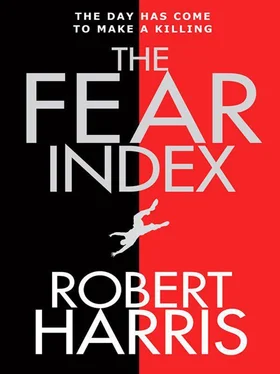Robert Harris - The Fear Index
Здесь есть возможность читать онлайн «Robert Harris - The Fear Index» весь текст электронной книги совершенно бесплатно (целиком полную версию без сокращений). В некоторых случаях можно слушать аудио, скачать через торрент в формате fb2 и присутствует краткое содержание. Жанр: Триллер, на английском языке. Описание произведения, (предисловие) а так же отзывы посетителей доступны на портале библиотеки ЛибКат.
- Название:The Fear Index
- Автор:
- Жанр:
- Год:неизвестен
- ISBN:нет данных
- Рейтинг книги:4 / 5. Голосов: 1
-
Избранное:Добавить в избранное
- Отзывы:
-
Ваша оценка:
- 80
- 1
- 2
- 3
- 4
- 5
The Fear Index: краткое содержание, описание и аннотация
Предлагаем к чтению аннотацию, описание, краткое содержание или предисловие (зависит от того, что написал сам автор книги «The Fear Index»). Если вы не нашли необходимую информацию о книге — напишите в комментариях, мы постараемся отыскать её.
The Fear Index — читать онлайн бесплатно полную книгу (весь текст) целиком
Ниже представлен текст книги, разбитый по страницам. Система сохранения места последней прочитанной страницы, позволяет с удобством читать онлайн бесплатно книгу «The Fear Index», без необходимости каждый раз заново искать на чём Вы остановились. Поставьте закладку, и сможете в любой момент перейти на страницу, на которой закончили чтение.
Интервал:
Закладка:
The Fear Index
Robert Harris
11.7.11
1
Learn from me, if not by my precepts, at least by my example, how dangerous is the acquirement of knowledge, and how much happier that man is who believes his native town to be the world, than he who aspires to become greater than his nature will allow.
MARY SHELLEY, Frankenstein (1818)Dr Alexander Hoffmann sat by the fire in his study in Geneva, a half-smoked cigar lying cold in the ashtray beside him, an anglepoise lamp pulled low over his shoulder, turning the pages of a first edition of The Expression of the Emotions in Man and Animals by Charles Darwin. The Victorian grandfather clock in the hall was striking midnight but Hoffmann did not hear it. Nor did he notice that the fire was almost out. All his formidable powers of attention were directed on to his book.
He knew it had been published in London in 1872 by John Murray amp; Co. in an edition of seven thousand copies, printed in two runs. He knew also that the second run had introduced a misprint – ‘htat’ – on page 208. As the volume in his hands contained no such error, he presumed it must have come from the first run, thus greatly increasing its value. He turned it round and inspected the spine. The binding was in the original green cloth with gilt lettering, the spine-ends only slightly frayed. It was what was known in the book trade as ‘a fine copy’, worth perhaps $15,000. He had found it waiting for him when he returned home from his office that evening, as soon as the New York markets had closed, a little after ten o’clock. Yet the strange thing was, even though he collected scientific first editions and had browsed the book online and had in fact been meaning to buy it, he had not actually ordered it.
His immediate thought had been that it must have come from his wife, but she had denied it. He had refused to believe her at first, following her around the kitchen as she set the table, holding out the book for her inspection.
‘You’re really telling me you didn’t buy it for me?’
‘Yes, Alex. Sorry. It wasn’t me. What can I say? Perhaps you have a secret admirer.’
‘You are totally sure about this? It’s not our anniversary or anything? I haven’t forgotten to give you something?’
‘For God’s sake, I didn’t buy it, okay?’
It had come with no message apart from a Dutch bookseller’s slip: ‘Rosengaarden amp; Nijenhuise, Antiquarian Scientific amp; Medical Books. Established 1911. Prinsengracht 227, 1016 HN Amsterdam, The Netherlands.’ Hoffmann had pressed the pedal on the waste bin and retrieved the bubble wrap and thick brown paper. The parcel was correctly addressed, with a printed label: ‘Dr Alexander Hoffmann, Villa Clairmont, 79 Chemin de Ruth, 1223 Cologny, Geneva, Switzerland.’ It had been dispatched by courier from Amsterdam the previous day.
After they had eaten their supper – a fish pie and green salad prepared by the housekeeper before she went home – Gabrielle had stayed in the kitchen to make a few anxious last-minute phone calls about her exhibition the next day, while Hoffmann had retreated to his study clutching the mysterious book. An hour later, when she put her head round the door to tell him she was going up to bed, he was still reading.
She said, ‘Try not to be too late, darling. I’ll wait up for you.’
He did not reply. She paused in the doorway and considered him for a moment. He still looked young for forty-two, and had always been more handsome than he realised – a quality she found attractive in a man as well as rare. It was not that he was modest, she had come to realise. On the contrary: he was supremely indifferent to anything that did not engage him intellectually, a trait that had earned him a reputation among her friends for being downright bloody rude – and she quite liked that as well. His preternaturally boyish American face was bent over the book, his spectacles pushed up and resting on the top of his thick head of light brown hair; catching the firelight, the lenses seemed to flash a warning look back at her. She knew better than to try to interrupt him. She sighed and went upstairs.
Hoffmann had known for years that The Expression of the Emotions in Man and Animals was one of the first books to be published with photographs, but he had never actually seen them before. Monochrome plates depicted Victorian artists’ models and inmates of the Surrey Lunatic Asylum in various states of emotion – grief, despair, joy, defiance, terror – for this was meant to be a study of Homo sapiens as animal, with an animal’s instinctive responses, stripped of the mask of social graces. Born far enough into the age of science to be photographed, their misaligned eyes and skewed teeth nonetheless gave them the look of crafty, superstitious peasants from the Middle Ages. They reminded Hoffmann of a childish nightmare – of grown-ups from an old-fashioned book of fairy tales who might come and steal you from your bed in the night and carry you off into the woods.
And there was another thing that unsettled him. The bookseller’s slip had been inserted into the pages devoted to the emotion of fear, as if the sender specifically intended to draw them to his attention:
The frightened man at first stands like a statue motionless or breathless, or crouches down as if instinctively to escape observation. The heart beats quickly and violently, so that it palpitates or knocks against the ribs…
Hoffmann had a habit when he was thinking of cocking his head to one side and gazing into the middle distance, and he did so now. Was this a coincidence? Yes, he reasoned, it must be. On the other hand, the physiological effects of fear were so directly relevant to VIXAL-4, the project he was presently involved in, that it did strike him as peculiarly pointed. And yet VIXAL-4 was highly secret, known only to his research team, and although he took care to pay them well – $250,000 was the starting salary, with much more on offer in bonuses – it was surely unlikely any of them would have spent $15,000 on an anonymous gift. One person who certainly could afford it, who knew all about the project and who would have seen the joke of it – if that was what this was: an expensive joke – was his business partner, Hugo Quarry, and Hoffmann, without even thinking about the hour, rang him.
‘Hello, Alex. How’s it going?’ If Quarry saw anything strange in being disturbed just after midnight, his perfect manners would never have permitted him to show it. Besides, he was accustomed to the ways of Hoffmann, ‘the mad professor’, as he called him – and called him it to his face as well as behind his back, it being part of his charm always to speak to everyone in the same way, public or private.
Hoffmann, still reading the description of fear, said distractedly, ‘Oh, hi. Did you just buy me a book?’
‘I don’t think so, old friend. Why? Was I supposed to?’
‘Someone’s just sent me a Darwin first edition and I don’t know who.’
‘Sounds pretty valuable.’
‘It is. I thought, because you know how important Darwin is to VIXAL, it might be you.’
‘’Fraid not. Could it be a client? A thank-you gift and they’ve forgotten to include a card? Lord knows, Alex, we’ve made them enough money.’
‘Yeah, well. Maybe. Okay. Sorry to bother you.’
‘Don’t worry. See you in the morning. Big day tomorrow. In fact, it’s already tomorrow. You ought to be in bed by now.’
‘Sure. On my way. Night.’
As fear rises to an extreme pitch, the dreadful scream of terror is heard. Great beads of sweat stand on the skin. All the muscles of the body are relaxed. Utter prostration soon follows, and the mental powers fail. The intestines are affected. The sphincter muscles cease to act, and no longer retain the contents of the body…
Читать дальшеИнтервал:
Закладка:
Похожие книги на «The Fear Index»
Представляем Вашему вниманию похожие книги на «The Fear Index» списком для выбора. Мы отобрали схожую по названию и смыслу литературу в надежде предоставить читателям больше вариантов отыскать новые, интересные, ещё непрочитанные произведения.
Обсуждение, отзывы о книге «The Fear Index» и просто собственные мнения читателей. Оставьте ваши комментарии, напишите, что Вы думаете о произведении, его смысле или главных героях. Укажите что конкретно понравилось, а что нет, и почему Вы так считаете.










